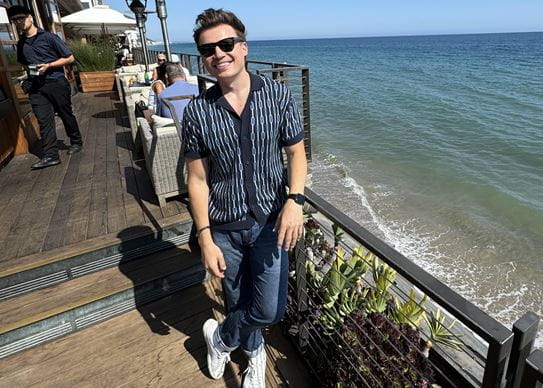It’s been 2 years since Canadian singer, Shawn Hook, was diagnosed with tonsil cancer in 2023, and 1 year since he first shared his story with the Canadian Cancer Society (CCS) in 2024. Newly cancer-free last year, Shawn had spoken about his life after treatment and his recent return to music.
One year later, Shawn shares his experience with recovery, his full return to music and performing, and becoming a source of support to those currently going through cancer.
I'm happy to be feeling like myself a year out from when [I last spoke with CCS]. I'm two years beyond [the beginning of my treatment] now. I can say I'm cancer-free. In a way, I'm happy that I'm able to kind of give back and share my story. Hopefully, anyone who might be unfortunately facing their cancer and treatment journey – it might help bring them some peace in mind.

1 year later
Shawn expresses gratitude for all the support he’s received during treatment and through his recovery. This includes everyone from his healthcare team to his fiancé, family and friends, to the Canadian music community and his fans.
“I turned to friends and family and people who had gone through cancer themselves. You have this connection and bond. It was really important for me to find that community and have those discussions. It really was supportive.”
In the past year, Shawn has become a source of support for people around him who are currently going through cancer themselves.
In some ways, I've become a bit of the shoulder to lean on […] Where I am two years on, I feel positive. I hope some of that can wear off to other people who are going through it.
For the past two years, Shawn has supported Daffodil Month, the Canadian Cancer Society’s invitation for people across Canada to change the lives of those with cancer – a symbol of positivity that resonates with Shawn’s own cancer experience.
“April coincides with when I was diagnosed with cancer. My first month of treatment started in April, so it's an interesting anniversary in a way. There's a lot of emotions that surround it. The fact that Daffodil Month is a positive fundraising campaign puts a brighter spin on what I went through.”
From the early stages of his treatment, Shawn has repeated the sentence, “Cancer is not something that happened to me, but something that happened for me,” to keep him grounded.
During treatment, shifting his perspective to a more positive one helped him get through the challenges of each day.
“There were all these dark things that were happening, but I changed my perspective and a lot of amazing things happened after,” he says. “A year out from when I last told [CCS] that, I'm getting married in June to my fiancé, who was there for me by my bed through that dark time. That was a huge positive from the end of a life changing event. So many people and positive experiences came from my dark negative experience. So, I'd still choose to say it happened for me, not to me.”
Today, Shawn still holds that positive mentality, especially when he encounters post-treatment challenges.
“There are still moments. I still have some physical issues and things that show up negatively. Then I do have to go back and remind myself, ‘hey, you're here, you're breathing fresh air, you're able to go and play hockey with friends. I can sing, I can write music.’ I can do all the things that I did before cancer. It's not something that you just set and forget, but it is a great philosophy to keep, and it does keep me out of the dark.”
Returning to music
Music's always been my saviour, even before cancer. It's always been my emotional outlet and expression. And so, when I was going through such a dark time, I was very grateful.

To those who have just been diagnosed, Shawn would say, “Take it one at day a time. Ask questions, do research, try not to spiral. It's okay to spiral, you just have to take it a day at a time and think about the positive outcomes.”
Grateful for the outcome of his own treatment – including participating in a gene therapy trial – Shawn is an advocate for research and bringing new treatment modalities into the norm.
If you do support and you can support, just know that it's making a huge difference because there are people that that know what to do with those funds, and it is making a difference.

Help change the future of people affected by cancer.
Help create a future without cancer
With support from readers like you, we can continue to make a meaningful impact for people affected by cancer.
We are determined to increase survival, stop cancer before it starts, and improve lives. But we can’t do it without you.
If everyone reading this gave just $5, we could achieve our goal this month to fund the most promising research, compassionate support and transformative advocacy. Please give today because every contribution counts. Thank you.
